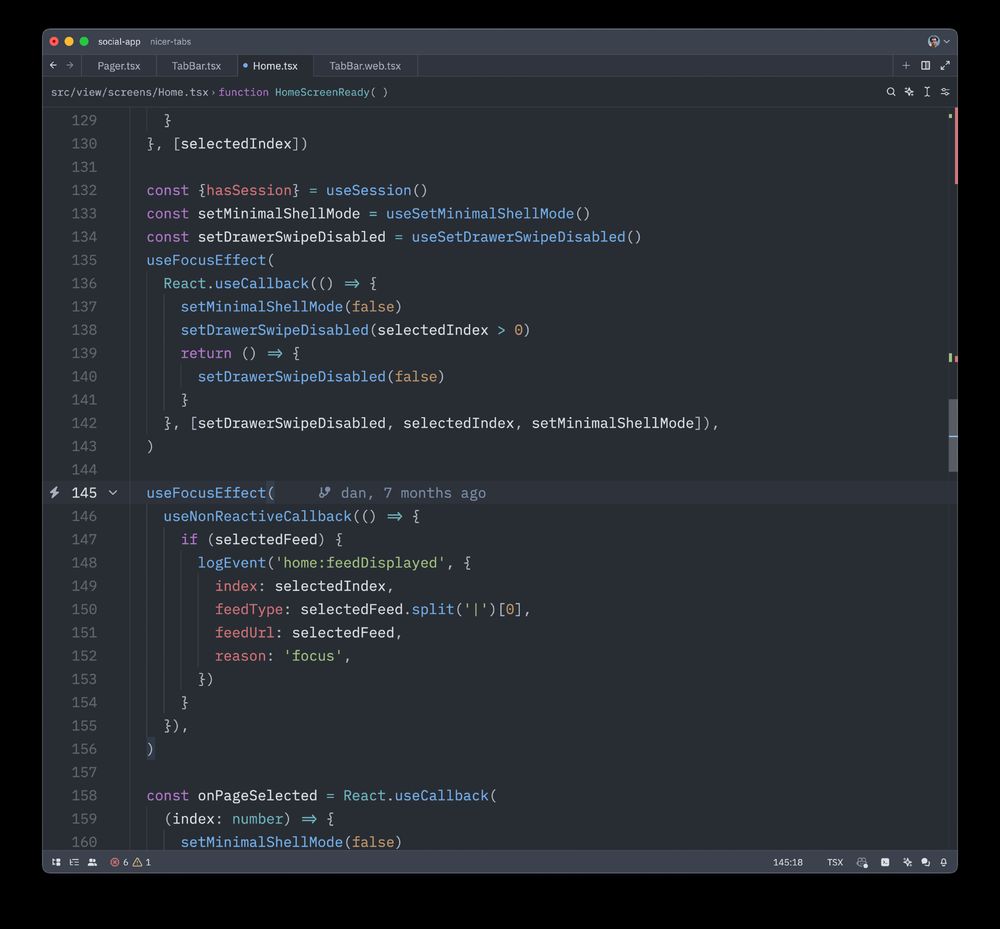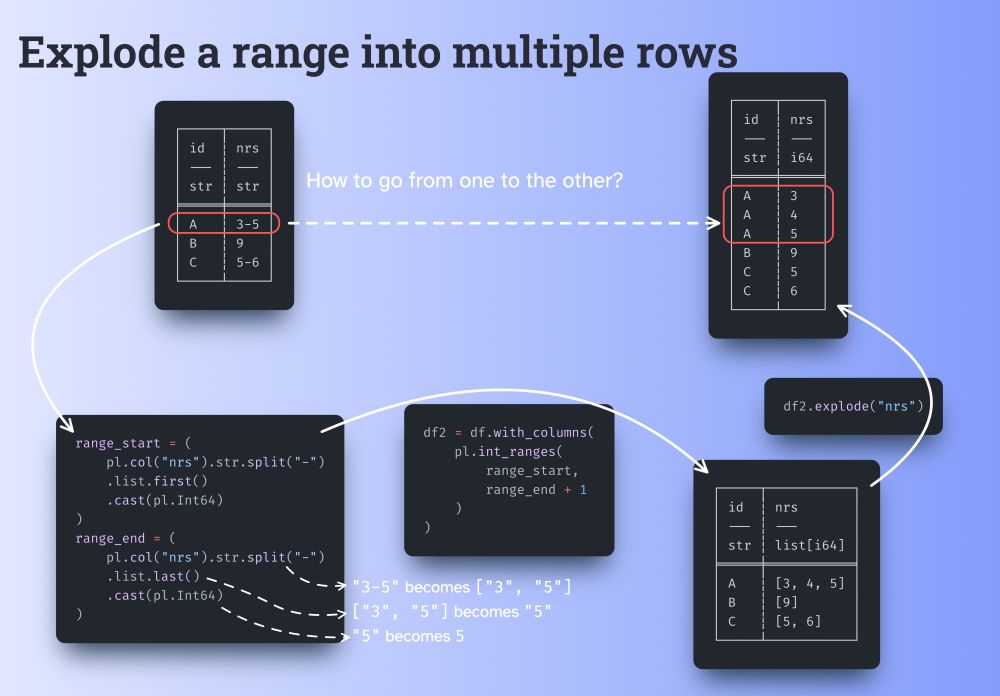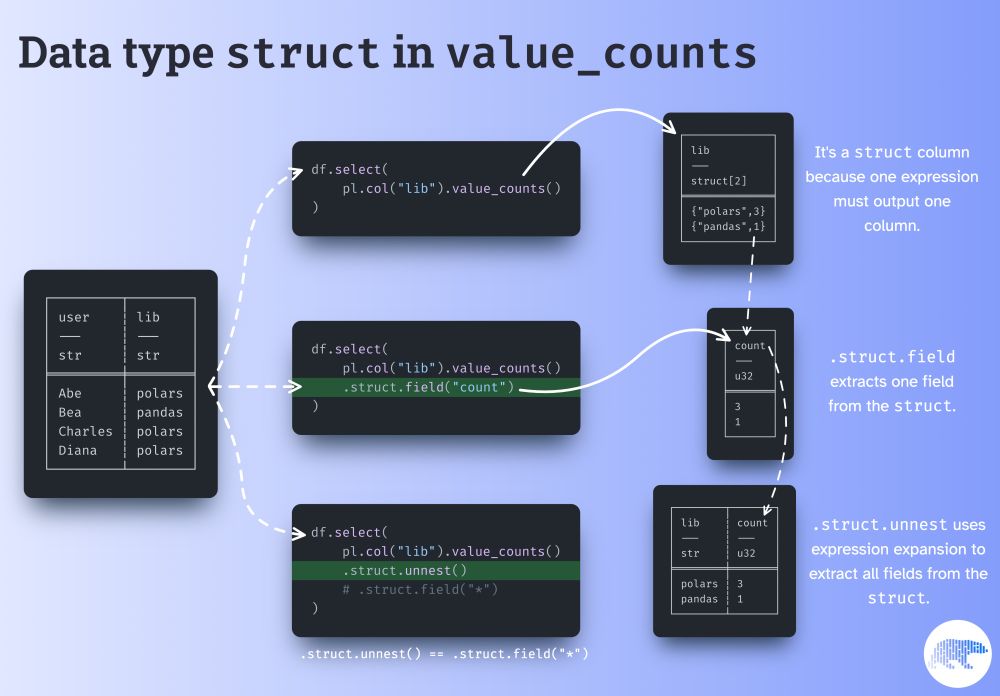Next.js works quite well with this setup tbh. Using the middleware and the route.ts routes that it offers, a lot of code that should be handled server-side, is handled server side.
01.12.2024 20:31 — 👍 2 🔁 0 💬 0 📌 0
Mostly CSR, but all authentication stuff is handled server-side. Building dynamic dashboards is quite difficult using SSR.
01.12.2024 20:29 — 👍 1 🔁 0 💬 1 📌 0
Appreciate the plug for Advent of Typescript @tkdodo.eu 👏
01.12.2024 13:51 — 👍 3 🔁 0 💬 0 📌 0

screenshot of zed editor, somehow both calming and vibrant, mmm
@zed.dev is so beautiful, a vibe
26.11.2024 02:27 — 👍 564 🔁 13 💬 54 📌 6
This is nice! I like the fact that queries are defined in a separate queries directory
25.11.2024 17:16 — 👍 0 🔁 0 💬 0 📌 0
eg.
- /data/queries/user.ts
import { queryOptions } form '@tanstack/react-query'
export const getPosts = queryOptions({
queryKey: ['posts'],
queryFn: getPosts,
})
- /components/feed.tsx
import { getPosts } from '/data/queries/user.ts'
const { data: posts } = useQuery(getPosts)
25.11.2024 11:00 — 👍 7 🔁 0 💬 2 📌 0
Defining your #reactquery queries with queryOptions is probably the easiest way to keep your growing application maintainable
25.11.2024 11:00 — 👍 2 🔁 0 💬 2 📌 0

A diagram shows how to use str.split, list.first / list.last, cast, pl.int_ranges, and explode, all together, to turn a dataframe where a column may contain ranges like "3-5" into a similar dataframe where all ranges have been expanded, or exploded, across multiple rows.
The full code is:
range_start = pl.col("nrs").str.split("-").list.first().cast(pl.Int64)
range_end = pl.col("nrs").str.split("-").list.last().cast(pl.Int64)
df.with_columns(pl.int_ranges(range_start, range_end + 1)).explode("nrs")
How to “expand” ranges like "3-5" across new rows with the values 3, 4, 5?
This comes straight from our Discord server (discord.com/invite/4UfP5...)
21.11.2024 14:36 — 👍 7 🔁 2 💬 0 📌 0

Diagram showing how `value_counts` produces a column with struct values, mapping column values to their counts.
We then show how to use `.struct.field` to extract a single field from the struct and how to use `.struct.unnest` to extract all fields into corresponding columns.
Why is there a `struct` data type?
A single expression produces a single column, so expressions like `value_counts` need to output structs to map the values to their counts.
With that said, do you understand why `.struct.unnest` doesn't break the 1 expr = 1 column principle?
20.11.2024 11:14 — 👍 7 🔁 2 💬 0 📌 0
A while ago I built my first OS project in Rust: a Telegram bot. It shares filterable deals subscribers. As of now, the bot shared over 1.2 million deals to subscribers, using only a Redis DB, without a second of downtime (thanks for hosting @glenndehaan.com 👏)
github.com/mjanssen/pep...
18.11.2024 15:37 — 👍 2 🔁 0 💬 0 📌 0
@tannerlinsley.com What would/should stop me from migrating our (still) relatively small Next.js frontend to @tanstack.com Start?
14.11.2024 10:37 — 👍 1 🔁 0 💬 1 📌 0
👋
14.11.2024 10:34 — 👍 0 🔁 0 💬 0 📌 0
Senior Web Engineer at Spotify. Prev, Riot. Next, React, Svelte, C++ when I'm feeling nasty. Beer, whiskey, coffee snob. Book lover. Jr Developer for life.
Bun is a fast, all-in-one toolkit for installing, bundling, running and testing JavaScript & TypeScript.
To install Bun:
```
curl https://bun.sh/install | bash -s
```
https://bun.sh
🔥 Join 45k React devs - Stay up-to-date:
📨 ThisWeekInReact.com
Docusaurus maintainer @ Meta
compiling JavaScript: https://porffor.dev
TC39 & WinterTC invited expert
20. they/them 🌈
project lead matrix.org | CEO/CTO Element
I'll help you take your Python skills to the next level!
Get a daily drop of Python knowledge 🐍💧 -> https://mathspp.com/drops
Pydon'ts – free Python book 👉 https://mathspp.com/books/pydonts
Matrix is an open network for secure, decentralised communication. Please support at matrix.org/support
Author and Founder of Polars
Dataframes powered by a multithreaded, vectorized query engine, written in Rust.
Rustlang and Rustlang accessories
* YouTube: https://www.youtube.com/@chrisbiscardi
* Learn Rust: https://www.rustadventure.dev/
* Rust Discord: https://discord.gg/GJ5UfxzUcP
* Party Corgi Content Discord: https://discord.gg/partycorgi
python, rust, terraform, k8s
Low key finance high key drunkenness
Art, Activism and Accountability
https://linktr.ee/ledbydonkeys?utm_source=linktree_admin_share
React core team • Forbes 30 worst over 30
design + code - shadcn.com



